NISSAN FRONTIER 2013 D40 / 2.G Consumer Safety Air Bag Information Guide
Manufacturer: NISSAN, Model Year: 2013, Model line: FRONTIER, Model: NISSAN FRONTIER 2013 D40 / 2.GPages: 19, PDF Size: 0.45 MB
Page 11 of 19
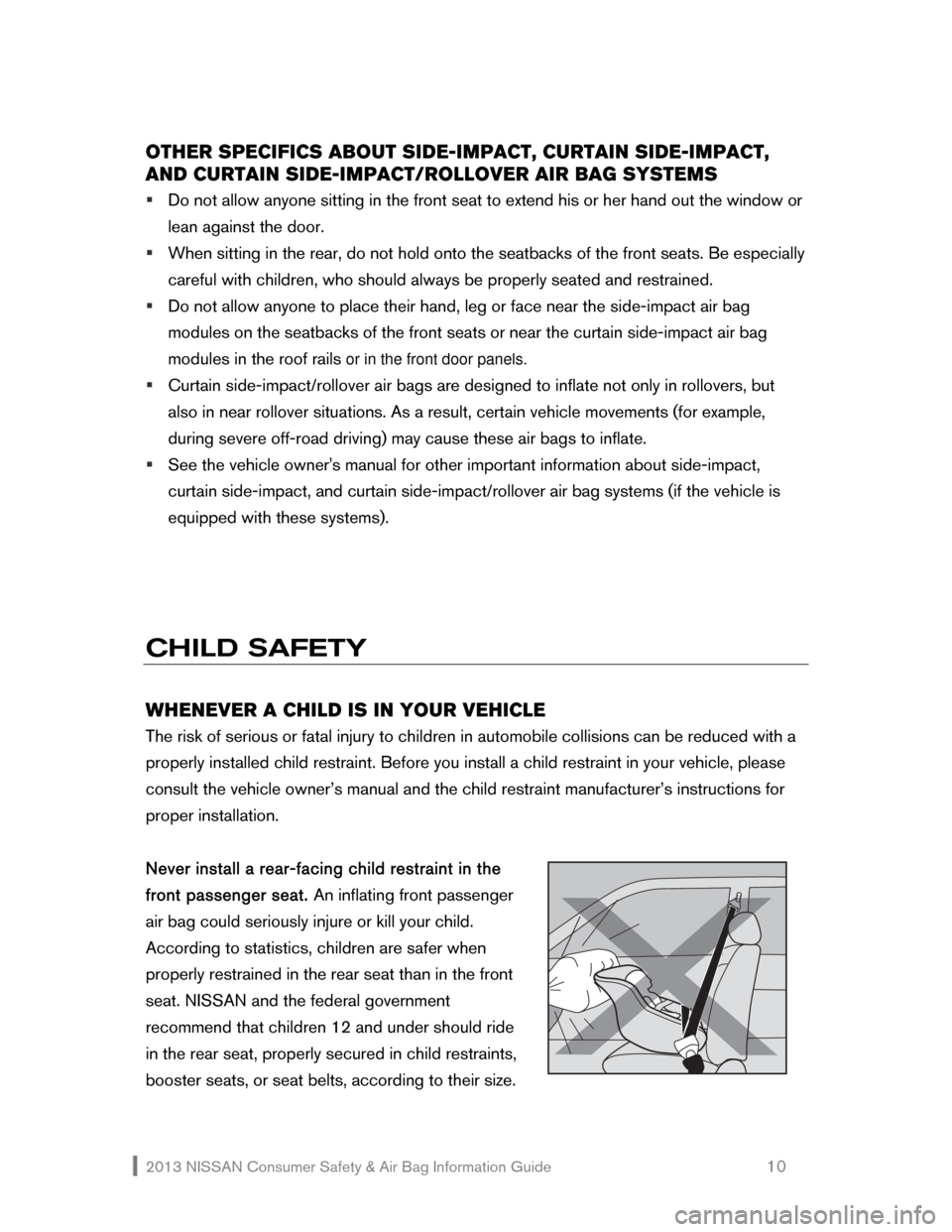
2013 NISSAN Consumer Safety & Air Bag Information Guide 10
OTHER SPECIFICS ABOUT SIDE-IMPACT, CURTAIN SIDE-IMPACT,
AND CURTAIN SIDE-IMPACT/ROLLOVER AIR BAG SYSTEMS
�ƒ Do not allow anyone sitting in the front seat to extend his or her hand out the window or
lean against the door.
�ƒ When sitting in the rear, do not hold onto the seatbacks of the front seats. Be especially
careful with children, who should always be properly seated and restrained.
�ƒ Do not allow anyone to place their hand, leg or face near the side-impact air bag
modules on the seatbacks of the front seats or near the curtain side-impact air bag
modules in the roof rails
or in the front door panels.
�ƒ Curtain side-impact/rollover air bags are designed to inflate not only in rollovers, but
also in near rollover situations. As a result, certain vehicle movements (for example,
during severe off-road driving) may cause these air bags to inflate.
�ƒ See the vehicle owner's manual for other important information about side-impact,
curtain side-impact, and curtain side-impact/rollover air bag systems (if the vehicle is
equipped with these systems).
CHILD SAFETY
WHENEVER A CHILD IS IN YOUR VEHICLE
The risk of serious or fatal injury to children in automobile collisions can be reduced with a
properly installed child restraint. Before you install a child restraint in your vehicle, please
consult the vehicle owner’s manual and the child restraint manufacturer’s instructions for
proper installation.
Never install a rear-facing child restraint in the
front passenger seat. An inflating front passenger
air bag could seriously injure or kill your child.
According to statistics, children are safer when
properly restrained in the rear seat than in the front
seat. NISSAN and the federal government
recommend that children 12 and under should ride
in the rear seat, properly secured in child restraints,
booster seats, or seat belts, according to their size.
Page 12 of 19
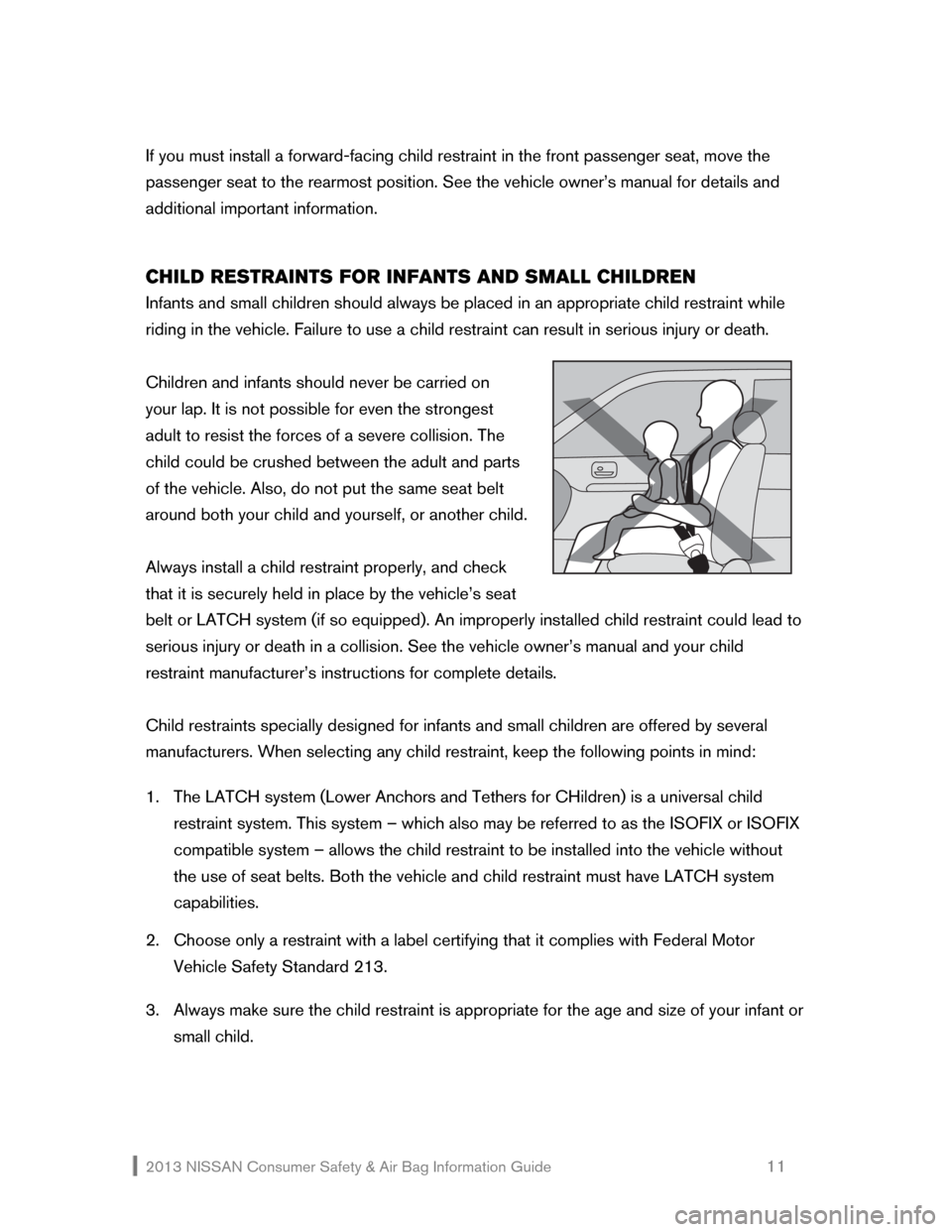
2013 NISSAN Consumer Safety & Air Bag Information Guide 11
If you must install a forward-facing child restraint in the front passenger seat, move the
passenger seat to the rearmost position. See the vehicle owner’s manual for details and
additional important information.
CHILD RESTRAINTS FOR INFANTS AND SMALL CHILDREN
Infants and small children should always be placed in an appropriate child restraint while
riding in the vehicle. Failure to use a child restraint can result in serious injury or death.
Children and infants should never be carried on
your lap. It is not possible for even the strongest
adult to resist the forces of a severe collision. The
child could be crushed between the adult and parts
of the vehicle. Also, do not put the same seat belt
around both your child and yourself, or another child.
Always install a child restraint properly, and check
that it is securely held in place by the vehicle’s seat
belt or LATCH system (if so equipped). An improperly installed child restraint could lead to
serious injury or death in a collision. See the vehicle owner’s manual and your child
restraint manufacturer’s instructions for complete details.
Child restraints specially designed for infants and small children are offered by several
manufacturers. When selecting any child restraint, keep the following points in mind:
1. The LATCH system (Lower Anchors and Tethers for CHildren) is a universal child
restraint system. This system – which also may be referred to as the ISOFIX or ISOFIX
compatible system – allows the child restraint to be installed into the vehicle without
the use of seat belts. Both the vehicle and child restraint must have LATCH system
capabilities.
2. Choose only a restraint with a label certifying that it complies with Federal Motor
Vehicle Safety Standard 213.
3. Always make sure the child restraint is appropriate for the age and size of your infant or
small child.
Page 13 of 19
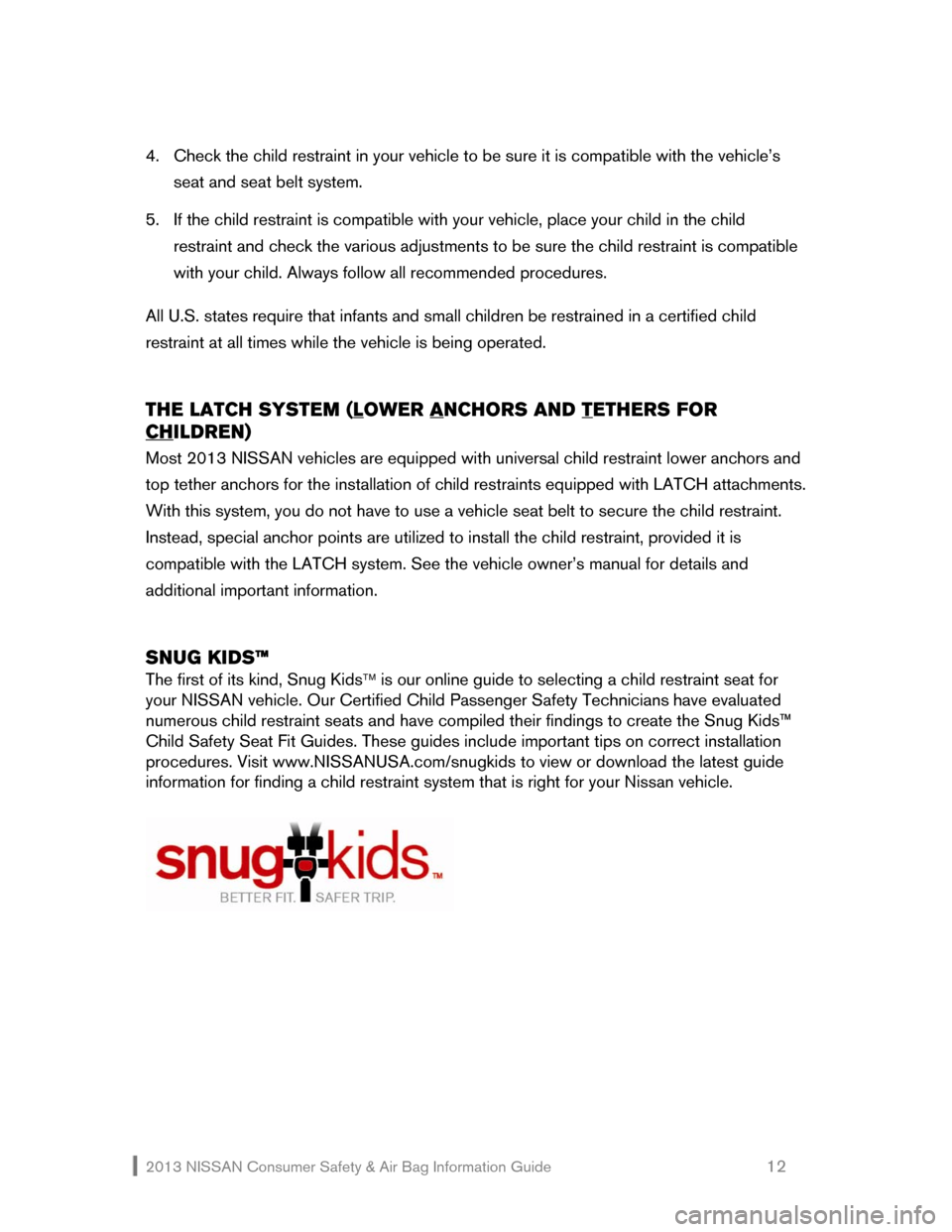
2013 NISSAN Consumer Safety & Air Bag Information Guide 12
4. Check the child restraint in your vehicle to be sure it is compatible with the vehicle’s
seat and seat belt system.
5. If the child restraint is compatible with your vehicle, place your child in the child
restraint and check the various adjustments to be sure the child restraint is compatible
with your child. Always follow all recommended procedures.
All U.S. states require that infants and small children be restrained in a certified child
restraint at all times while the vehicle is being operated.
THE LATCH SYSTEM (LOWER ANCHORS AND TETHERS FOR
CH
ILDREN)
Most 2013 NISSAN vehicles are equipped with universal child restraint lower anchors and
top tether anchors for the installation of child restraints equipped with LATCH attachments.
With this system, you do not have to use a vehicle seat belt to secure the child restraint.
Instead, special anchor points are utilized to install the child restraint, provided it is
compatible with the LATCH system. See the vehicle owner’s manual for details and
additional important information.
SNUG KIDS™
The first of its kind, Snug Kids™ is our online guide to selecting a child restraint seat for
your NISSAN vehicle. Our Certified Child Passenger Safety Technicians
have evaluated
numerous child restraint seats and have compiled their findings to create the Snug Kids™
Child Safety Seat Fit Guides. These guides include important tips on correct installation
procedures. Visit www.NISSANUSA.com/snugkids to view or download the latest guide
information for finding a child restraint system that is right for your Nissan vehicle.
Page 14 of 19
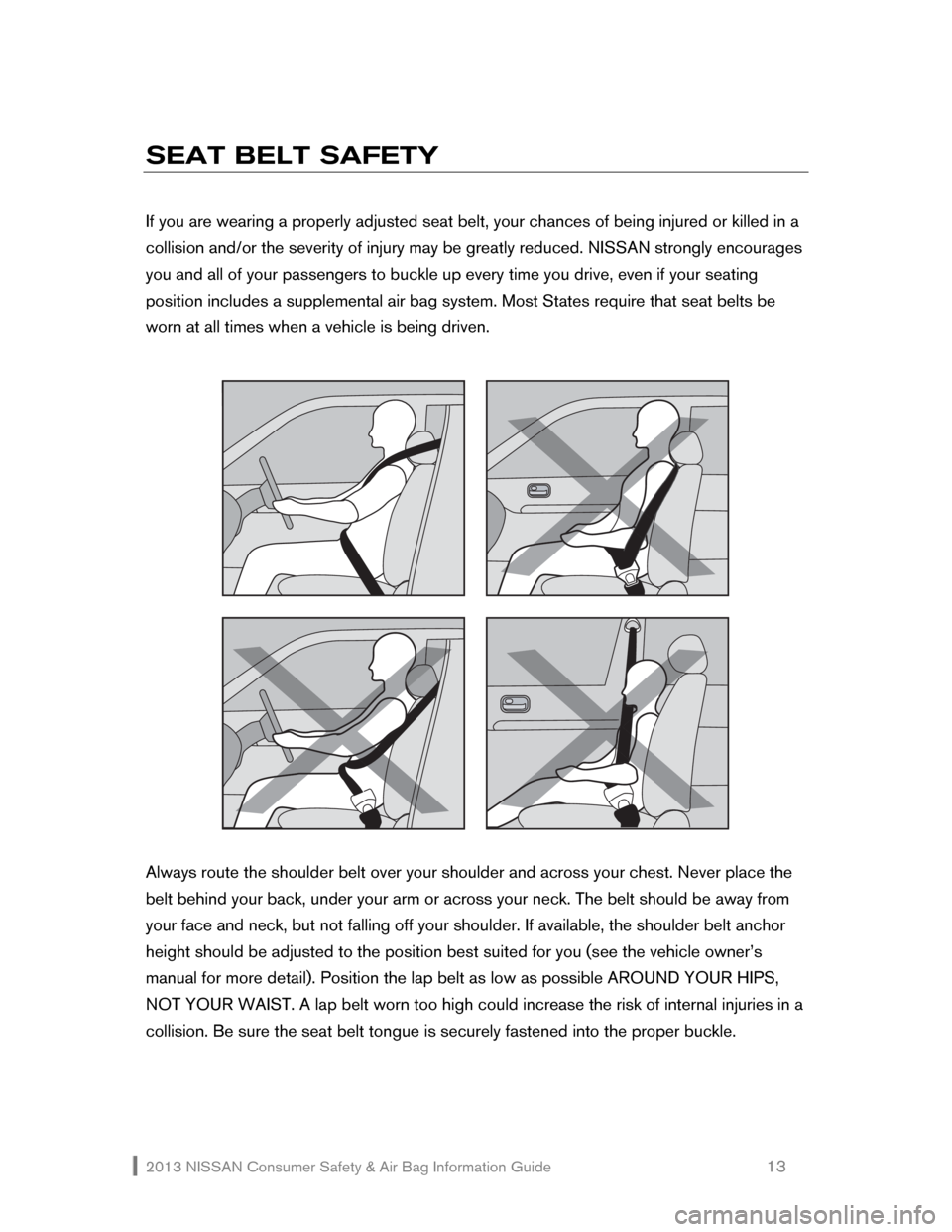
2013 NISSAN Consumer Safety & Air Bag Information Guide 13
SEAT BELT SAFETY
If you are wearing a properly adjusted seat belt, your chances of being injured or killed in a
collision and/or the severity of injury may be greatly reduced. NISSAN strongly encourages
you and all of your passengers to buckle up every time you drive, even if your seating
position includes a supplemental air bag system. Most States require that seat belts be
worn at all times when a vehicle is being driven.
Always route the shoulder belt over your shoulder and across your chest. Never place the
belt behind your back, under your arm or across your neck. The belt should be away from
your face and neck, but not falling off your shoulder. If available, the shoulder belt anchor
height should be adjusted to the position best suited for you (see the vehicle owner’s
manual for more detail). Position the lap belt as low as possible AROUND YOUR HIPS,
NOT YOUR WAIST. A lap belt worn too high could increase the risk of internal injuries in a
collision. Be sure the seat belt tongue is securely fastened into the proper buckle.
Page 15 of 19
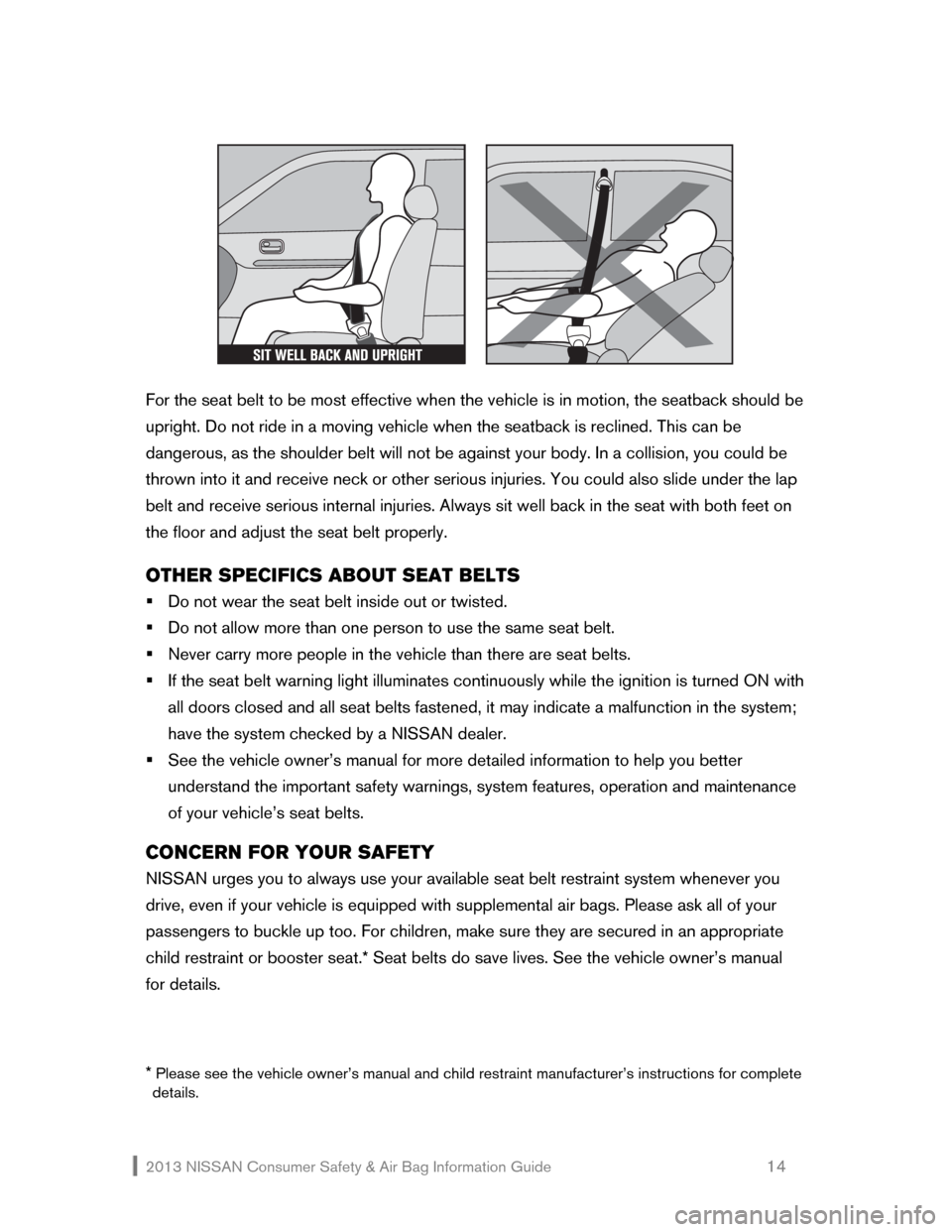
2013 NISSAN Consumer Safety & Air Bag Information Guide 14
For the seat belt to be most effective when the vehicle is in motion, the seatback should be
upright. Do not ride in a moving vehicle when the seatback is reclined. This can be
dangerous, as the shoulder belt will not be against your body. In a collision, you could be
thrown into it and receive neck or other serious injuries. You could also slide under the lap
belt and receive serious internal injuries. Always sit well back in the seat with both feet on
the floor and adjust the seat belt properly.
OTHER SPECIFICS ABOUT SEAT BELTS
�ƒ Do not wear the seat belt inside out or twisted.
�ƒ Do not allow more than one person to use the same seat belt.
�ƒ Never carry more people in the vehicle than there are seat belts.
�ƒ If the seat belt warning light illuminates continuously while the ignition is turned ON with
all doors closed and all seat belts fastened, it may indicate a malfunction in the system;
have the system checked by a NISSAN dealer.
�ƒ See the vehicle owner’s manual for more detailed information to help you better
understand the important safety warnings, system features, operation and maintenance
of your vehicle’s seat belts.
CONCERN FOR YOUR SAFETY
NISSAN urges you to always use your available seat belt restraint system whenever you
drive, even if your vehicle is equipped with supplemental air bags. Please ask all of your
passengers to buckle up too. For children, make sure they are secured in an appropriate
child restraint or booster seat.* Seat belts do save lives. See the vehicle owner’s manual
for details.
* Please see the vehicle owner’s manual and child restraint manufacturer’s instructions for complete
details.
Page 16 of 19
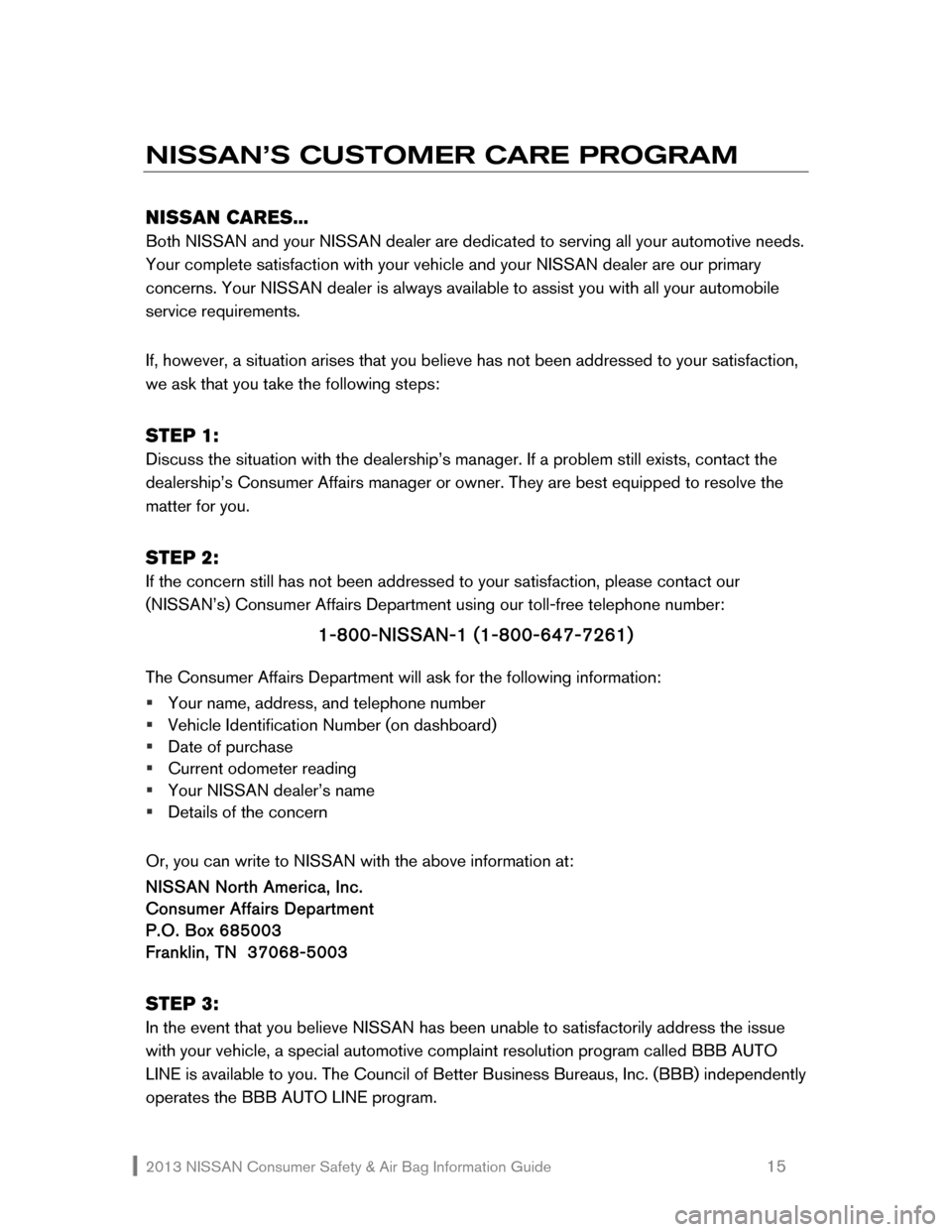
2013 NISSAN Consumer Safety & Air Bag Information Guide 15
NISSAN’S CUSTOMER CARE PROGRAM
NISSAN CARES...
Both NISSAN and your NISSAN dealer are dedicated to serving all your automotive needs.
Your complete satisfaction with your vehicle and your NISSAN dealer are our primary
concerns. Your NISSAN dealer is always available to assist you with all your automobile
service requirements.
If, however, a situation arises that you believe has not been addressed to your satisfaction,
we ask that you take the following steps:
STEP 1:
Discuss the situation with the dealership’s manager. If a problem still exists, contact the
dealership’s Consumer Affairs manager or owner. They are best equipped to resolve the
matter for you.
STEP 2:
If the concern still has not been addressed to your satisfaction, please contact our
(NISSAN’s) Consumer Affairs Department using our toll-free telephone number:
1-800-NISSAN-1 (1-800-647-7261)
The Consumer Affairs Department will ask for the following information:
�ƒ Your name, address, and telephone number
�ƒ Vehicle Identification Number (on dashboard)
�ƒ Date of purchase
�ƒ Current odometer reading
�ƒ Your NISSAN dealer’s name
�ƒ Details of the concern
Or, you can write to NISSAN with the above information at:
NISSAN North America, Inc.
Consumer Affairs Department
P.O. Box 685003
Franklin, TN 37068-5003
STEP 3:
In the event that you believe NISSAN has been unable to satisfactorily address the issue
with your vehicle, a special automotive complaint resolution program called BBB AUTO
LINE is available to you. The Council of Better Business Bureaus, Inc. (BBB) independently
operates the BBB AUTO LINE program.
Page 17 of 19
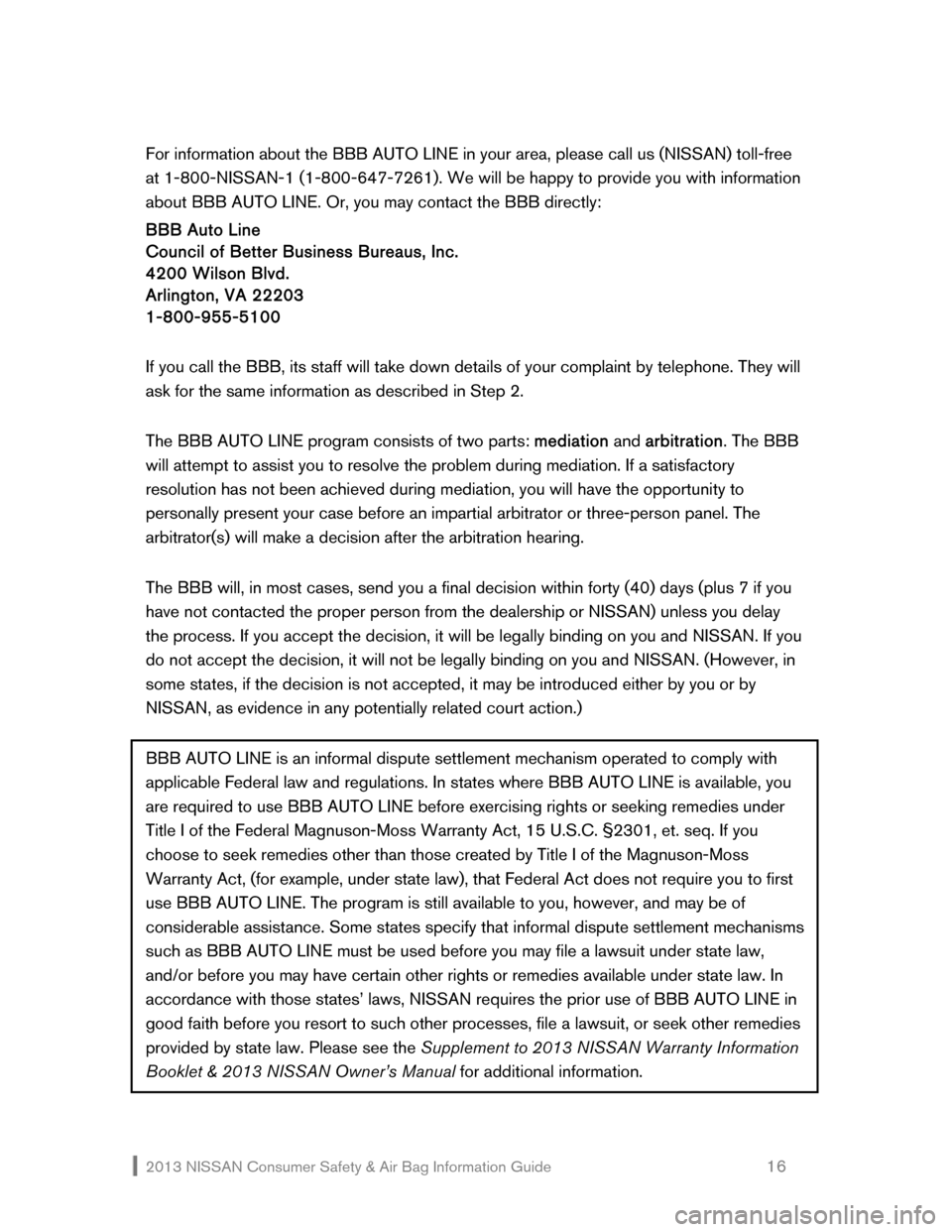
2013 NISSAN Consumer Safety & Air Bag Information Guide 16
For information about the BBB AUTO LINE in your area, please call us (NISSAN) toll-free
at 1-800-NISSAN-1 (1-800-647-7261). We will be happy to provide you with information
about BBB AUTO LINE. Or, you may contact the BBB directly:
BBB Auto Line
Council of Better Business Bureaus, Inc.
4200 Wilson Blvd.
Arlington, VA 22203
1-800-955-5100
If you call the BBB, its staff will take down details of your complaint by telephone. They will
ask for the same information as described in Step 2.
The BBB AUTO LINE program consists of two parts: mediation and arbitration. The BBB
will attempt to assist you to resolve the problem during mediation. If a satisfactory
resolution has not been achieved during mediation, you will have the opportunity to
personally present your case before an impartial arbitrator or three-person panel. The
arbitrator(s) will make a decision after the arbitration hearing.
The BBB will, in most cases, send you a final decision within forty (40) days (plus 7 if you
have not contacted the proper person from the dealership or NISSAN) unless you delay
the process. If you accept the decision, it will be legally binding on you and NISSAN. If you
do not accept the decision, it will not be legally binding on you and NISSAN. (However, in
some states, if the decision is not accepted, it may be introduced either by you or by
NISSAN, as evidence in any potentially related court action.)
BBB AUTO LINE is an informal dispute settlement mechanism operated to comply with
applicable Federal law and regulations. In states where BBB AUTO LINE is available, you
are required to use BBB AUTO LINE before exercising rights or seeking remedies under
Title I of the Federal Magnuson-Moss Warranty Act, 15 U.S.C. §2301, et. seq. If you
choose to seek remedies other than those created by Title I of the Magnuson-Moss
Warranty Act, (for example, under state law), that Federal Act does not require you to first
use BBB AUTO LINE. The program is still available to you, however, and may be of
considerable assistance. Some states specify that informal dispute settlement mechanisms
such as BBB AUTO LINE must be used before you may file a lawsuit under state law,
and/or before you may have certain other rights or remedies available under state law. In
accordance with those states’ laws, NISSAN requires the prior use of BBB AUTO LINE in
good faith before you resort to such other processes, file a lawsuit, or seek other remedies
provided by state law. Please see the Supplement to 2013 NISSAN Warranty Information
Booklet & 2013 NISSAN Owner’s Manual for additional information.
Page 18 of 19
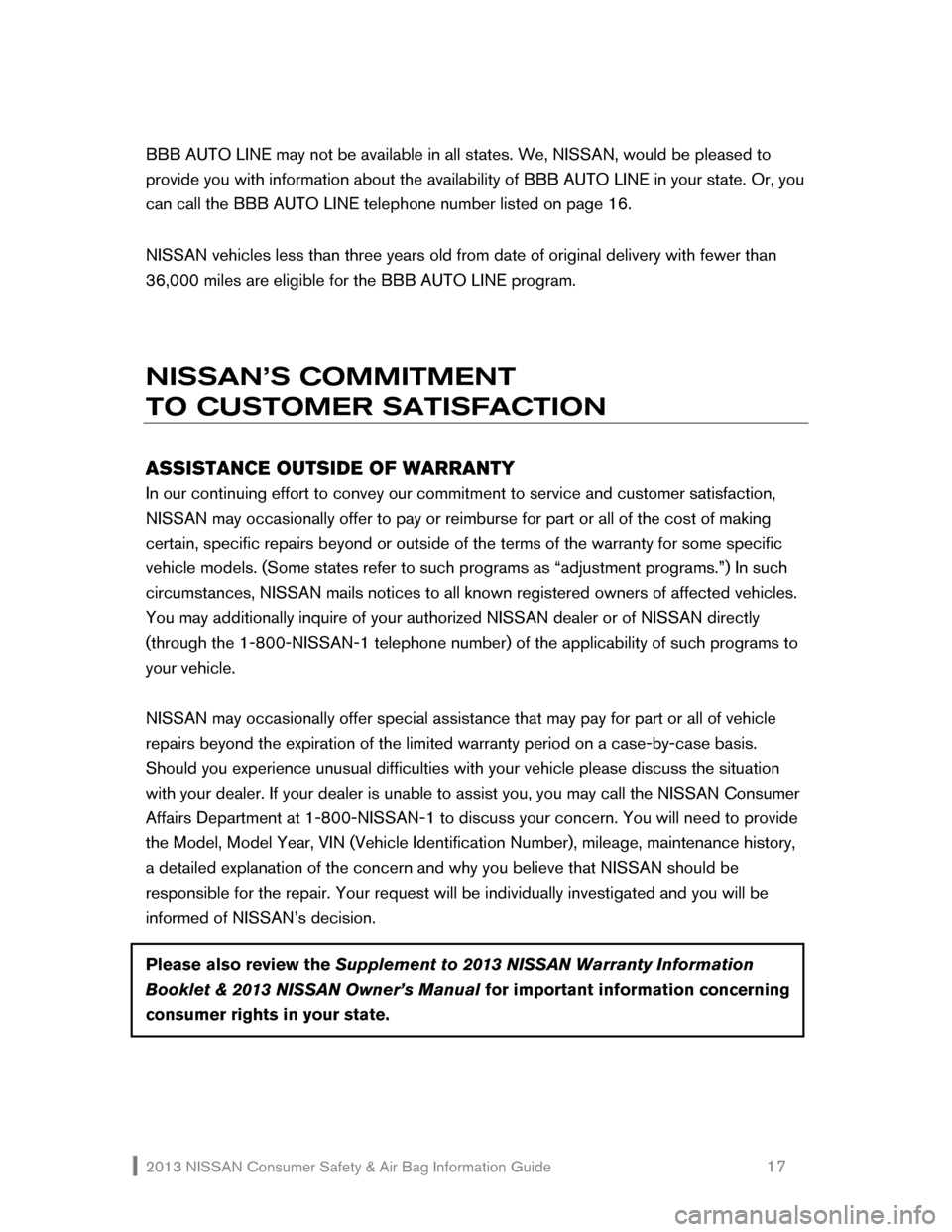
2013 NISSAN Consumer Safety & Air Bag Information Guide 17
BBB AUTO LINE may not be available in all states. We, NISSAN, would be pleased to
provide you with information about the availability of BBB AUTO LINE in your state. Or, you
can call the BBB AUTO LINE telephone number listed on page 16.
NISSAN vehicles less than three years old from date of original delivery with fewer than
36,000 miles are eligible for the BBB AUTO LINE program.
NISSAN’S COMMITMENT
TO CUSTOMER SATISFACTION
ASSISTANCE OUTSIDE OF WARRANTY
In our continuing effort to convey our commitment to service and customer satisfaction,
NISSAN may occasionally offer to pay or reimburse for part or all of the cost of making
certain, specific repairs beyond or outside of the terms of the warranty for some specific
vehicle models. (Some states refer to such programs as “adjustment programs.”) In such
circumstances, NISSAN mails notices to all known registered owners of affected vehicles.
You may additionally inquire of your authorized NISSAN dealer or of NISSAN directly
(through the 1-800-NISSAN-1 telephone number) of the applicability of such programs to
your vehicle.
NISSAN may occasionally offer special assistance that may pay for part or all of vehicle
repairs beyond the expiration of the limited warranty period on a case-by-case basis.
Should you experience unusual difficulties with your vehicle please discuss the situation
with your dealer. If your dealer is unable to assist you, you may call the NISSAN Consumer
Affairs Department at 1-800-NISSAN-1 to discuss your concern. You will need to provide
the Model, Model Year, VIN (Vehicle Identification Number), mileage, maintenance history,
a detailed explanation of the concern and why you believe that NISSAN should be
responsible for the repair. Your request will be individually investigated and you will be
informed of NISSAN’s decision.
Please also review the Supplement to 2013 NISSAN Warranty Information
Booklet & 2013 NISSAN Owner’s Manual for important information concerning
consumer rights in your state.
Page 19 of 19
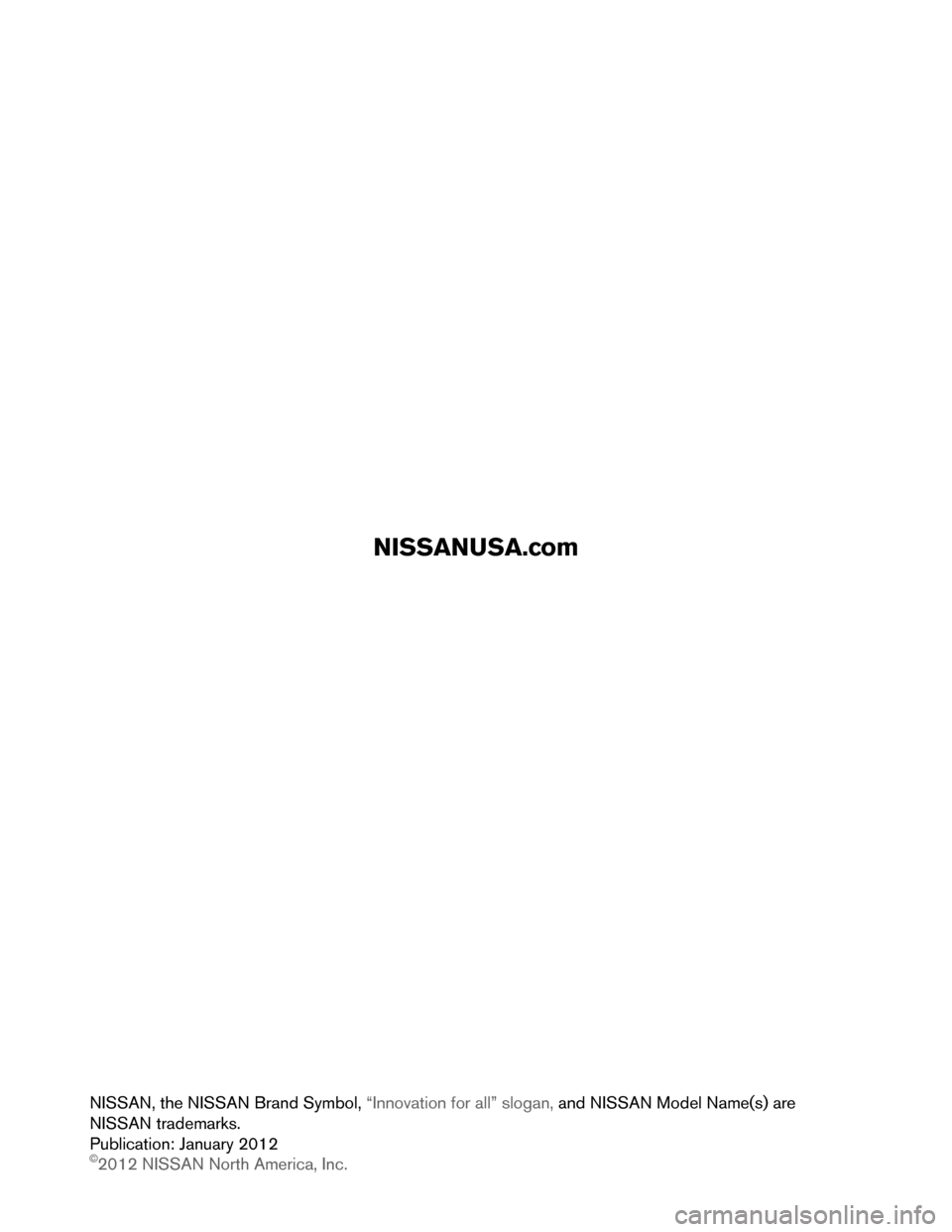
2013 NISSAN Consumer Safety & Air Bag Information Guide 18
NISSANUSA.com
NISSAN, the NISSAN Brand Symbol, “Innovation for all” slogan, and NISSAN Model Name(s) are
NISSAN trademarks.
Publication: January 2012
©2012 NISSAN North America, Inc.